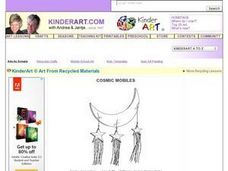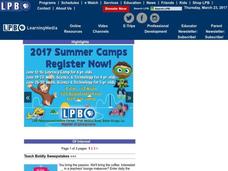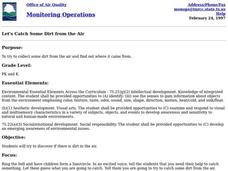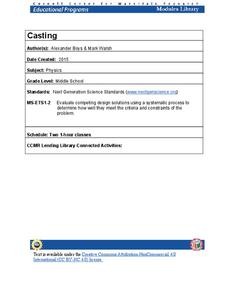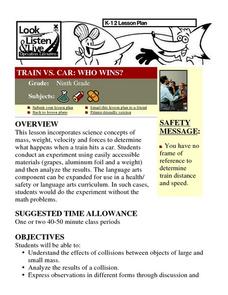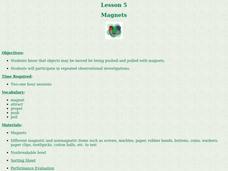Curated OER
Cosmic Mobiles: Recycled Art
If you have a little left over tinsel and aluminum foil, your class can create these fun moon and star mobiles. Poster board or recycled cardboard become your moon and stars; the tinsel gives them sparkle. This would be a great activity...
Curated OER
Observe Earth Day with Art Projects Made from Recycled Materials
Creative hands-on art project ideas that are easy on the earth and easy on a teacher’s budget.
Baylor College
What Is the Water Cycle?
Small groups place sand and ice in a covered box, place the box in the sunlight, then observe as evaporation, condensation, and precipitation occur. These models serve as miniature water cycles and demonstrations of the three phases of...
Curated OER
Art: Hovering Helicopters
Students research the history of helicopters and differentiate between the various models. while observing pictures of helicopters in action, they discuss their unique capabilities compared to other means of transportation. Finally,...
Curated OER
ALUMINUM RECYCLING
Students describe how aluminum is recycled. They study a diagram illustrating the recycling path of an aluminum can. They answer questions regarding aluminum. They write letters to recycling firms for information on starting a recycling...
Curated OER
Go Fish! Fish or other Sea Creature from Recycled Materials
Students create a unique, 3-d sculpture of a fish out of recycled materials. They brainstorm, what a fish looks like. Students research what fish look like. Also, students make sketches of their fish. Students write a reflection of...
Curated OER
Activity Plan 3-4: Freezing Paper
Students discover how paper reacts to temperature changes in order to cultivate their science prediction skills. In this frozen paper investigation, students paint pieces of newsprint with water and then freeze them overnight,...
Curated OER
Solar Oven
Students construct a solar oven using cardboard, duct tape, aluminum foil and other materials. They use the solar oven to cook something and keep a journal of their project.
University of Colorado
Looking Inside Planets
Researchers use scientific data to understand what is inside each of the planets. The first in a series of six, this lesson builds off of that concept by having pupils use a data table to create their own scale models of the interiors of...
Curated OER
Let's Catch Some Dirt From the Air
Students investigate the dirt in the air. In this air quality lesson, students use aluminum foil and petroleum jelly to discover if there is dirt in the air. Students discuss results.
Cornell University
Casting
Don't cast a great hands-on resource aside! Scholars learn about the process of casting by actually trying out an example. Plaster of Paris and cookie cutter molds help them complete the activity.
Curated OER
Chemistry Day With Glitter Wands
First graders observe examples of the three states of matter and identify matter in each of the three states. They make glitter wands to remind them of the three states of matter: solid, liquid and gas. Pupils brainstorm and record...
University of Colorado
Looking Inside Planets
All of the gas giant's atmospheres consist of hydrogen and helium, the same gases that make up all stars. The third in a series of 22, the activity challenges pupils to make scale models of the interiors of planets in order to...
Smithsonian Institution
Watching Crystals Grow
Amazing science can sometimes happen right before your eyes! The class gets cozy as they watch crystals grow. They use Epsom salts, rocks, and food coloring to create crystals. They'll observe the entire process, documenting every step...
Curated OER
Slash Trash! Reducing, Reusing and Recycling Our Way to Zero Waste
The other "Three Rs" are covered in this lesson: reduce, reuse, and recycle. Over four weeks, conservationists collect data about waste in their own homes. They combine their findings with those of other students in order to analyze...
Curated OER
Train vs. Car: Who Wins?
Ninth graders conduct an experiment demonstrating what happens when a train hits a car using easily accessible materials. They calculate momentum, velocity, and distance using the appropriate formulas. Then they write an incident report...
Curated OER
Magnets
Learners conduct an experiment. In this magnets lesson, students review what they know about magnetism, work in groups to determine the magnetism of various objects and discuss their results.
Curated OER
Cells are 3-D!
Students design three dimensional models of plant and animal cells. They identify the cells parts, and compare animal and plant cells.
Curated OER
Understanding Climate
Fourth graders create two dioramas out of household materials to compare the influence of various factors that impact climate. Each group discuss how the change in factors influenced the climate, flora, and fauna of their area.
Curated OER
The Akron Global Polymer Academy Lesson Plan Format
Students identify types of garbage that will decompose quickly and the ones that do not. In this decomposing instructional activity students observe and record the photo degrading of six pack rings.
Curated OER
A Cosmic Cafeteria
Students indentify and differentiate between transit and surface food systems. Students measure energy that is released by various foods. Students compare and contrast cooking with solar energy on earth and what they might have learned...


